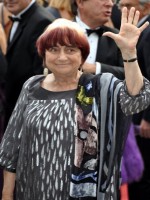Serge Gainsbourg is a Actor, Director, Scriptwriter and Sound French born on 2 april 1928 at Paris (France)

Serge Gainsbourg (born Lucien Ginsburg; [sɛʁʒ ɡɛ̃sbuʁ]; 2 April 1928 – 2 March 1991) was a French singer, songwriter, pianist, film composer, poet, painter, screenwriter, writer, actor, and director. Regarded as one of the most important figures in French popular music, he was renowned for his often provocative and scandalous releases, as well as his diverse artistic output, which embodied genres ranging from jazz, mambo, world, chanson, pop and yé-yé, to rock and roll, progressive rock, reggae, electronic, disco, new wave, and funk. Gainsbourg's varied musical style and individuality make him difficult to categorize although his legacy has been firmly established and he is often regarded as one of the world's most influential popular musicians.
His lyrical work incorporated a vast amount of clever word play to hoodwink the listener, often for humorous, provocative, satirical or subversive reasons. Common types of word play in his songs include mondegreen, onomatopoeia, rhyme, spoonerism, dysphemism, paraprosdokian and pun. Through the course of his career, Gainsbourg wrote over 550 songs, which have been covered more than a thousand times by a wide range of artists. Since his death, Gainsbourg's music has reached legendary stature in France. He has also gained a cult following in the English-speaking world, with numerous artists influenced by his arrangements.
Gainsbourg's childhood was profoundly affected by the occupation of France by Germany in World War II. The identifying yellow star Jews were required to wear became a symbol and haunted Gainsbourg and which in later years he was able to transmute into creative inspiration. During the occupation, the Jewish Ginsburg family was able to make their way from Paris to Limoges, traveling under false papers. Limoges was in the Zone libre under the administration of the collaborationist Vichy government and still a perilous refuge for Jews. After the war, Gainsbourg obtained work teaching music and drawing in a school outside of Paris, in Mesnil-Le-Roi. The school was set up under the auspices of local rabbis, for the orphaned children of murdered deportees. Here Gainsbourg heard the accounts of Nazi persecution and genocide, stories that resonated for Gainsbourg far into the future. Before he was 30 years old, Gainsbourg was a disillusioned painter but earned his living as a piano player in bars.
Gainsbourg changed his first name to Serge, feeling that this was representative of his Russian background and because, as Jane Birkin relates: "Lucien reminded him of a hairdresser's assistant." He chose Gainsbourg as his last name, in homage to the English painter Thomas Gainsborough, whom he admired.
He married Elisabeth "Lize" Levitsky on 3 November 1951 and divorced in 1957. He married a second time on 7 January 1964, to Françoise-Antoinette "Béatrice" Pancrazzi (b. 28 July 1931), with whom he had two children: a daughter named Natacha (b. 8 August 1964) and a son, Paul (born in spring 1968). He divorced Béatrice in February 1966.
In late 1967 he had a short but ardent love affair with Brigitte Bardot, to whom he dedicated the song and album Initials BB.
In mid-1968 Gainsbourg fell in love with the younger English singer and actress Jane Birkin, whom he met during the shooting of the film Slogan. Their relationship lasted over a decade. In 1971 they had a daughter, the actress and singer Charlotte Gainsbourg. Although many sources state that they were married, according to their daughter Charlotte this was not the case. Birkin left Gainsbourg in 1980.
Birkin remembers the beginning of her affair with Gainsbourg: he first took her to a nightclub, then to a transvestite club and afterwards to the Hilton hotel where he passed out in a drunken stupor. Birkin left Gainsbourg when pregnant with her third daughter Lou by the film director Jacques Doillon.
His last partner was Bambou (Caroline Paulus, grandniece of German field marshal Friedrich Paulus of Stalingrad fame). In 1986, they had a son, Lucien (known as Lulu).
In 2010, Lise Lévitzky published a book called "Lise et Lulu" which raises the possibility of the homosexuality of Serge Gainsbourg.
Early work
His early songs were influenced by Boris Vian and were largely in the vein of old-fashioned chanson.
Around 1957 he backed the Parisian "Cabaret Milord l'Arsouille" star, singer Michèle Arnaud.
She discovered a shy songwriter, who considered his compositions too modern and provocative for mainstream chanson.
Arnaud offered to sing and even record such songs, and propelled his early career.
Later Gainsbourg began to move beyond this and experiment with a succession of musical styles: modern jazz early on, yé-yé and brit-pop in the 1960s, funk, rock and reggae in the 1970s and electronica in the 1980s.
Many of his songs contained themes with a bizarre, morbid or sexual twist in them. An early success, "Le Poinçonneur des Lilas", describes the day in the life of a Paris Métro ticket man, whose job is to stamp holes in passengers' tickets. Gainsbourg describes this chore as so monotonous, that the man eventually thinks of putting a hole into his own head and being buried in another.
By the time the yéyés arrived in France, Gainsbourg was 32 years old and was not feeling very comfortable: he spent much time with Jacques Brel or Juliette Greco but the public and critics rejected him, mocking his prominent ears and nose. During this period, Gainsbourg began working with Greco, a collaboration that lasted throughout the 'Left Bank' period culminating in the song La Javanaise in the fall of 1962.
He performed a few duets in 1964 with the artist Philippe Clay, with whom he shared some resemblance. Around this time, Gainsbourg met Elek Bacsik and Michel Gaudry and asked them to make a record with him. This would become Confidentiel, which exuded a modern jazz aesthetic that pleased Gainsbourg, despite knowing that such a sound would not allow him access to success. The album sold only 1,500 copies. The decision was taken right upon leaving the studio: "I'll get into hack work and buy myself a Rolls". Still, his next album, Gainsbourg Percussions, inspired by the rhythms and melodies of Miriam Makeba and Babatunde Olatunji, was a world away from the yéyé wave, on the scene which was to become a key to the Gainsbourg fortune.
More success began to arrive when, in 1965, his song Poupée de cire, poupée de son was the Luxembourg entry in the Eurovision Song Contest. Performed by French teen and charming singer France Gall, it won first prize. The song was recorded in English as "A Lonely Singing Doll" by British teen idol Twinkle.
His next song for Gall, Les Sucettes (Lollipops), caused a scandal in France: Gainsbourg had written the song with double-meanings and strong sexual innuendo of which the singer was apparently unaware when she recorded it. Whereas Gall thought that the song was about a girl enjoying lollipops, it was actually about oral sex. The controversy arising from the song, although a big hit for Gall, threw her career off-track in France for several years.
Gainsbourg arranged other Gall songs and LPs that were characteristic of the late 1960s psychedelic styles, among them Gall's 1968 album. Another one of Serge's songs Boum Bada Boum, was entered by Monaco in the 1967 contest, sung by Minouche Barelli; it came fifth. He also wrote hit songs for other artists, such as Comment Te Dire Adieu for Françoise Hardy, Anna Karina (Sous le soleil exactement, Ne dis rien) and his lifelong friend and muse-égérie, Michèle Arnaud (Les Papillons Noirs).
His relationship with Brigitte Bardot led to a series of prominent pop duets, such as Ford Mustang and Bonnie and Clyde.
In 1969, he released Je t'aime... moi non plus, which featured explicit lyrics and simulated sounds of female orgasm. The song appeared that year on an LP, Jane Birkin/Serge Gainsbourg. Originally recorded with Brigitte Bardot, it was released with his future girlfriend Birkin when Bardot backed out. While Gainsbourg declared it the "ultimate love song", it was considered too "hot"; the song was censored or banned from public broadcast in numerous countries and in France even the toned-down version was suppressed. The Vatican made a public statement citing the song as offensive. Despite (or perhaps because of) the controversy, it sold well and charted within the top ten in many European countries.
The 1970s
Histoire de Melody Nelson was released in 1971. This concept album, produced and arranged by Jean-Claude Vannier, tells the story of a Lolita-esque affair, with Gainsbourg as the narrator. It features prominent string arrangements and even a massed choir at its tragic climax. The album has proven influential with artists such as Air, David Holmes, Jarvis Cocker, Beck and Dan the Automator.
In 1975, he released the album Rock Around the Bunker, an album written entirely on the subject of National Socialism. Gainsbourg used black comedy, as he and his family had suffered during World War II, being forced to wear the yellow star as the mark of a Jew. Rock Around the Bunker belonged to the mid-1970s "retro" trend.
The next year saw the release of another major work, L'Homme à tête de chou (Cabbage-Head Man), featuring the new character Marilou and sumptuous orchestral themes. Cabbage-Head Man is one of his nicknames, as it refers to his ears. Musically, L'homme à tête de chou turned out to be Gainsbourg's last LP, in the English rock style he had favoured since the late 1960s. He would go on to produce two reggae albums recorded in Jamaica (1979 and 1981) and two electronic funk albums recorded in New York (1984 and 1987).
In Jamaica in 1979, he recorded "Aux Armes et cætera", a reggae version of the French national anthem "La Marseillaise", with Robbie Shakespeare, Sly Dunbar and Rita Marley. Following harsh and anti-semitic criticism in right-wing newspaper Le Figaro by Charles de Gaulle biographer Michel Droit, his song earned him death threats from right-wing veteran soldiers of the Algerian War of Independence, who were opposed to their national anthem being arranged in reggae style. In 1979, a show had to be cancelled, because an angry mob of French Army parachutists came to demonstrate in the audience. Alone onstage, Gainsbourg rose his fist and answered "The true meaning of our national anthem is revolutionary" and sung it with the audience. The soldiers joined them, a scene enjoyed by millions as French TV news broadcast it, creating more publicity. Shortly afterward, Gainsbourg bought the original manuscript of "La Marseillaise". He replied to his critics that his version was, in fact, closer to the original as the manuscript clearly shows the words "Aux armes et cætera..." for the chorus. This fine album, described by legendary drummer Sly Dunbar as "Perhaps the best record he ever played on" was his biggest commercial success, including major hits Lola Rastaquouère, Aux Armes Et Cætera and a French version of Sam Theard's jazz classic You Rascal You entitled Vieille Canaille. Rita Marley and the I-Three would record another controversial reggae album with him in 1981, Mauvaises nouvelles des étoiles. Bob Marley was furious, when he discovered that Gainsbourg made his wife Rita sing erotic lyrics. Posthumous new mixes, including dub versions by Soljie Hamilton and versions of both albums by Jamaican artists were released as double "Dub Style" albums in 2003, to critical praise in France as well as abroad and to international commercial success. Although belatedly, Aux Armes Et Cætera – Dub Style and Mauvaises Nouvelles Des Étoiles – Dub Style further posthumously established Gainsbourg as an influential icon in European pop music.
Final years
In 1982, Gainsbourg wrote an album for French rocker Alain Bashung, Play blessures. The album, although now considered a masterpiece by French critics, was a commercial failure.
After a turbulent 13-year relationship, Jane Birkin left Gainsbourg. In the 1980s, near the end of his life, Gainsbourg became a regular figure on French TV. His appearances seemed devoted to his controversial sense of humour and provocation. In March 1984, he burned three-quarters of a 500 French franc bill on television to protest against taxes raising up to 75% of income.
He would show up drunk and unshaven on stage: in April 1986, on Michel Drucker's live Saturday evening show, with the American singer Whitney Houston, he objected to Drucker's translating his comments to Whitney Houston and in English stated: "I said, I want to fuck her" - Drucker insisted this meant "He says you are great..." The same year, in another talk show interview, he appeared alongside Catherine Ringer, a well known singer who had appeared in pornographic films. Gainsbourg spat out at her, "You're nothing but a filthy whore, a filthy, fucking whore".
His songs became increasingly eccentric during this period, ranging from the anti-drug Aux Enfants de la Chance, to the highly controversial duet with his daughter Charlotte named Lemon Incest. This translates as "Inceste de citron", a wordplay on "un zeste de citron" (a lemon zest). The title demonstrates Gainsbourg's love for puns – another example of which is Beau oui comme Bowie, a song he gave to Isabelle Adjani.
By December 1988, while a judge at a film festival in Val d'Isère, he was extremely intoxicated at a local theatre where he was to do a presentation. While on stage he began to tell an obscene story about Brigitte Bardot and a champagne bottle, only to stagger offstage and collapse in a nearby seat. Subsequent years saw his health deteriorate. He had to undergo liver surgery but denied any connection to cancer or cirrhosis. His appearances and releases became sparser as he had to rest and recover in Vezelay. During these final years, he released Love on the Beat, a controversial electronic album with mostly sexual themes in the lyrics and his last studio album, You're Under Arrest, presented more synth-driven songs.
Film work
Acting
Gainsbourg appeared in nearly 50 film and television roles. In 1960, he co-starred with Rhonda Fleming in the Italian film La rivolta degli schiavi (The Revolt of the Slaves) as Corvino, the Roman Emperor Massimiano's evil henchman. In 1968 he wrote music for and appeared as himself in Le Pacha directed by Georges Lautner. In 1969, he appeared in William Klein's pop art satire Mr. Freedom, and in the same year he starred with Jane Birkin in Les Chemins de Katmandou (The Pleasure Pit). They acted together again in Cannabis the following year, and again in Seven Deaths in the Cat's Eye in 1973, and he also made a brief appearance with Birkin in Herbert Vesely's 1980 film, Egon Schiele – Exzess und Bestrafung.
He co-starred alongside Birkin in the French film Slogan for which he wrote the title song "La Chanson de Slogan". Also with Birkin, he acted in the French-Yugoslav film Devetnaest djevojaka i jedan mornar (19 girls and one sailor) where he played a role of a partisan.
Directing
Gainsbourg directed five movies: Je t'aime ... moi non plus, Le Physique et le Figuré, Équateur, Charlotte for Ever, and Stan the Flasher.
Composing
Throughout his career, Gainsbourg wrote the soundtracks for nearly 60 films and television programs. In 1996, he received a posthumous César Award for Best Music Written for a Film for Élisa, along with Zbigniew Preisner and Michel Colombier.
Writing
Gainsbourg wrote a novel entitled Evguénie Sokolov.
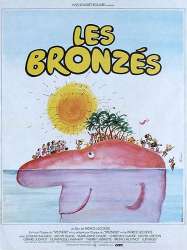 (1978)
(1978)
(Original Music Composer) (1995)
(1995)
(Original Music Composer) (1977)
(1977)
(Music)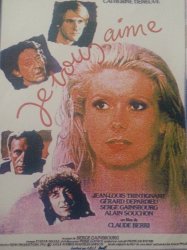 (1980)
(1980)
(Actor) (1986)
(1986)
(Original Music Composer) (1970)
(1970)
(Original Music Composer)
Source : Wikidata
Serge Gainsbourg

- Infos
- Photos
- Best films
- Family
- Characters
- Awards
Birth name Lucien Ginsburg
Nationality France
Birth 2 april 1928 at Paris (France)
Death 2 march 1991 (at 62 years) at Paris (France)
Nationality France
Birth 2 april 1928 at Paris (France)
Death 2 march 1991 (at 62 years) at Paris (France)
Serge Gainsbourg (born Lucien Ginsburg; [sɛʁʒ ɡɛ̃sbuʁ]; 2 April 1928 – 2 March 1991) was a French singer, songwriter, pianist, film composer, poet, painter, screenwriter, writer, actor, and director. Regarded as one of the most important figures in French popular music, he was renowned for his often provocative and scandalous releases, as well as his diverse artistic output, which embodied genres ranging from jazz, mambo, world, chanson, pop and yé-yé, to rock and roll, progressive rock, reggae, electronic, disco, new wave, and funk. Gainsbourg's varied musical style and individuality make him difficult to categorize although his legacy has been firmly established and he is often regarded as one of the world's most influential popular musicians.
His lyrical work incorporated a vast amount of clever word play to hoodwink the listener, often for humorous, provocative, satirical or subversive reasons. Common types of word play in his songs include mondegreen, onomatopoeia, rhyme, spoonerism, dysphemism, paraprosdokian and pun. Through the course of his career, Gainsbourg wrote over 550 songs, which have been covered more than a thousand times by a wide range of artists. Since his death, Gainsbourg's music has reached legendary stature in France. He has also gained a cult following in the English-speaking world, with numerous artists influenced by his arrangements.
Biography
Born in Paris, France, Gainsbourg was the son of Jewish Ukrainian migrants, Joseph Ginsburg (28 December 1898, in Kharkov, now Ukraine then Russian Empire – 22 April 1971) and Olga (née Bessman; 1894 – 16 March 1985), who fled to Paris after the 1917 Russian Revolution. Joseph Ginsburg was a classically trained musician whose profession was playing the piano in cabarets and casinos; he taught his children, Gainsbourg and his twin sister Liliane to play the piano.Gainsbourg's childhood was profoundly affected by the occupation of France by Germany in World War II. The identifying yellow star Jews were required to wear became a symbol and haunted Gainsbourg and which in later years he was able to transmute into creative inspiration. During the occupation, the Jewish Ginsburg family was able to make their way from Paris to Limoges, traveling under false papers. Limoges was in the Zone libre under the administration of the collaborationist Vichy government and still a perilous refuge for Jews. After the war, Gainsbourg obtained work teaching music and drawing in a school outside of Paris, in Mesnil-Le-Roi. The school was set up under the auspices of local rabbis, for the orphaned children of murdered deportees. Here Gainsbourg heard the accounts of Nazi persecution and genocide, stories that resonated for Gainsbourg far into the future. Before he was 30 years old, Gainsbourg was a disillusioned painter but earned his living as a piano player in bars.
Gainsbourg changed his first name to Serge, feeling that this was representative of his Russian background and because, as Jane Birkin relates: "Lucien reminded him of a hairdresser's assistant." He chose Gainsbourg as his last name, in homage to the English painter Thomas Gainsborough, whom he admired.
He married Elisabeth "Lize" Levitsky on 3 November 1951 and divorced in 1957. He married a second time on 7 January 1964, to Françoise-Antoinette "Béatrice" Pancrazzi (b. 28 July 1931), with whom he had two children: a daughter named Natacha (b. 8 August 1964) and a son, Paul (born in spring 1968). He divorced Béatrice in February 1966.
In late 1967 he had a short but ardent love affair with Brigitte Bardot, to whom he dedicated the song and album Initials BB.
In mid-1968 Gainsbourg fell in love with the younger English singer and actress Jane Birkin, whom he met during the shooting of the film Slogan. Their relationship lasted over a decade. In 1971 they had a daughter, the actress and singer Charlotte Gainsbourg. Although many sources state that they were married, according to their daughter Charlotte this was not the case. Birkin left Gainsbourg in 1980.
Birkin remembers the beginning of her affair with Gainsbourg: he first took her to a nightclub, then to a transvestite club and afterwards to the Hilton hotel where he passed out in a drunken stupor. Birkin left Gainsbourg when pregnant with her third daughter Lou by the film director Jacques Doillon.
His last partner was Bambou (Caroline Paulus, grandniece of German field marshal Friedrich Paulus of Stalingrad fame). In 1986, they had a son, Lucien (known as Lulu).
In 2010, Lise Lévitzky published a book called "Lise et Lulu" which raises the possibility of the homosexuality of Serge Gainsbourg.
Early work
His early songs were influenced by Boris Vian and were largely in the vein of old-fashioned chanson.
Around 1957 he backed the Parisian "Cabaret Milord l'Arsouille" star, singer Michèle Arnaud.
She discovered a shy songwriter, who considered his compositions too modern and provocative for mainstream chanson.
Arnaud offered to sing and even record such songs, and propelled his early career.
Later Gainsbourg began to move beyond this and experiment with a succession of musical styles: modern jazz early on, yé-yé and brit-pop in the 1960s, funk, rock and reggae in the 1970s and electronica in the 1980s.
Many of his songs contained themes with a bizarre, morbid or sexual twist in them. An early success, "Le Poinçonneur des Lilas", describes the day in the life of a Paris Métro ticket man, whose job is to stamp holes in passengers' tickets. Gainsbourg describes this chore as so monotonous, that the man eventually thinks of putting a hole into his own head and being buried in another.
By the time the yéyés arrived in France, Gainsbourg was 32 years old and was not feeling very comfortable: he spent much time with Jacques Brel or Juliette Greco but the public and critics rejected him, mocking his prominent ears and nose. During this period, Gainsbourg began working with Greco, a collaboration that lasted throughout the 'Left Bank' period culminating in the song La Javanaise in the fall of 1962.
He performed a few duets in 1964 with the artist Philippe Clay, with whom he shared some resemblance. Around this time, Gainsbourg met Elek Bacsik and Michel Gaudry and asked them to make a record with him. This would become Confidentiel, which exuded a modern jazz aesthetic that pleased Gainsbourg, despite knowing that such a sound would not allow him access to success. The album sold only 1,500 copies. The decision was taken right upon leaving the studio: "I'll get into hack work and buy myself a Rolls". Still, his next album, Gainsbourg Percussions, inspired by the rhythms and melodies of Miriam Makeba and Babatunde Olatunji, was a world away from the yéyé wave, on the scene which was to become a key to the Gainsbourg fortune.
More success began to arrive when, in 1965, his song Poupée de cire, poupée de son was the Luxembourg entry in the Eurovision Song Contest. Performed by French teen and charming singer France Gall, it won first prize. The song was recorded in English as "A Lonely Singing Doll" by British teen idol Twinkle.
His next song for Gall, Les Sucettes (Lollipops), caused a scandal in France: Gainsbourg had written the song with double-meanings and strong sexual innuendo of which the singer was apparently unaware when she recorded it. Whereas Gall thought that the song was about a girl enjoying lollipops, it was actually about oral sex. The controversy arising from the song, although a big hit for Gall, threw her career off-track in France for several years.
Gainsbourg arranged other Gall songs and LPs that were characteristic of the late 1960s psychedelic styles, among them Gall's 1968 album. Another one of Serge's songs Boum Bada Boum, was entered by Monaco in the 1967 contest, sung by Minouche Barelli; it came fifth. He also wrote hit songs for other artists, such as Comment Te Dire Adieu for Françoise Hardy, Anna Karina (Sous le soleil exactement, Ne dis rien) and his lifelong friend and muse-égérie, Michèle Arnaud (Les Papillons Noirs).
His relationship with Brigitte Bardot led to a series of prominent pop duets, such as Ford Mustang and Bonnie and Clyde.
In 1969, he released Je t'aime... moi non plus, which featured explicit lyrics and simulated sounds of female orgasm. The song appeared that year on an LP, Jane Birkin/Serge Gainsbourg. Originally recorded with Brigitte Bardot, it was released with his future girlfriend Birkin when Bardot backed out. While Gainsbourg declared it the "ultimate love song", it was considered too "hot"; the song was censored or banned from public broadcast in numerous countries and in France even the toned-down version was suppressed. The Vatican made a public statement citing the song as offensive. Despite (or perhaps because of) the controversy, it sold well and charted within the top ten in many European countries.
The 1970s
Histoire de Melody Nelson was released in 1971. This concept album, produced and arranged by Jean-Claude Vannier, tells the story of a Lolita-esque affair, with Gainsbourg as the narrator. It features prominent string arrangements and even a massed choir at its tragic climax. The album has proven influential with artists such as Air, David Holmes, Jarvis Cocker, Beck and Dan the Automator.
In 1975, he released the album Rock Around the Bunker, an album written entirely on the subject of National Socialism. Gainsbourg used black comedy, as he and his family had suffered during World War II, being forced to wear the yellow star as the mark of a Jew. Rock Around the Bunker belonged to the mid-1970s "retro" trend.
The next year saw the release of another major work, L'Homme à tête de chou (Cabbage-Head Man), featuring the new character Marilou and sumptuous orchestral themes. Cabbage-Head Man is one of his nicknames, as it refers to his ears. Musically, L'homme à tête de chou turned out to be Gainsbourg's last LP, in the English rock style he had favoured since the late 1960s. He would go on to produce two reggae albums recorded in Jamaica (1979 and 1981) and two electronic funk albums recorded in New York (1984 and 1987).
In Jamaica in 1979, he recorded "Aux Armes et cætera", a reggae version of the French national anthem "La Marseillaise", with Robbie Shakespeare, Sly Dunbar and Rita Marley. Following harsh and anti-semitic criticism in right-wing newspaper Le Figaro by Charles de Gaulle biographer Michel Droit, his song earned him death threats from right-wing veteran soldiers of the Algerian War of Independence, who were opposed to their national anthem being arranged in reggae style. In 1979, a show had to be cancelled, because an angry mob of French Army parachutists came to demonstrate in the audience. Alone onstage, Gainsbourg rose his fist and answered "The true meaning of our national anthem is revolutionary" and sung it with the audience. The soldiers joined them, a scene enjoyed by millions as French TV news broadcast it, creating more publicity. Shortly afterward, Gainsbourg bought the original manuscript of "La Marseillaise". He replied to his critics that his version was, in fact, closer to the original as the manuscript clearly shows the words "Aux armes et cætera..." for the chorus. This fine album, described by legendary drummer Sly Dunbar as "Perhaps the best record he ever played on" was his biggest commercial success, including major hits Lola Rastaquouère, Aux Armes Et Cætera and a French version of Sam Theard's jazz classic You Rascal You entitled Vieille Canaille. Rita Marley and the I-Three would record another controversial reggae album with him in 1981, Mauvaises nouvelles des étoiles. Bob Marley was furious, when he discovered that Gainsbourg made his wife Rita sing erotic lyrics. Posthumous new mixes, including dub versions by Soljie Hamilton and versions of both albums by Jamaican artists were released as double "Dub Style" albums in 2003, to critical praise in France as well as abroad and to international commercial success. Although belatedly, Aux Armes Et Cætera – Dub Style and Mauvaises Nouvelles Des Étoiles – Dub Style further posthumously established Gainsbourg as an influential icon in European pop music.
Final years
In 1982, Gainsbourg wrote an album for French rocker Alain Bashung, Play blessures. The album, although now considered a masterpiece by French critics, was a commercial failure.
After a turbulent 13-year relationship, Jane Birkin left Gainsbourg. In the 1980s, near the end of his life, Gainsbourg became a regular figure on French TV. His appearances seemed devoted to his controversial sense of humour and provocation. In March 1984, he burned three-quarters of a 500 French franc bill on television to protest against taxes raising up to 75% of income.
He would show up drunk and unshaven on stage: in April 1986, on Michel Drucker's live Saturday evening show, with the American singer Whitney Houston, he objected to Drucker's translating his comments to Whitney Houston and in English stated: "I said, I want to fuck her" - Drucker insisted this meant "He says you are great..." The same year, in another talk show interview, he appeared alongside Catherine Ringer, a well known singer who had appeared in pornographic films. Gainsbourg spat out at her, "You're nothing but a filthy whore, a filthy, fucking whore".
His songs became increasingly eccentric during this period, ranging from the anti-drug Aux Enfants de la Chance, to the highly controversial duet with his daughter Charlotte named Lemon Incest. This translates as "Inceste de citron", a wordplay on "un zeste de citron" (a lemon zest). The title demonstrates Gainsbourg's love for puns – another example of which is Beau oui comme Bowie, a song he gave to Isabelle Adjani.
By December 1988, while a judge at a film festival in Val d'Isère, he was extremely intoxicated at a local theatre where he was to do a presentation. While on stage he began to tell an obscene story about Brigitte Bardot and a champagne bottle, only to stagger offstage and collapse in a nearby seat. Subsequent years saw his health deteriorate. He had to undergo liver surgery but denied any connection to cancer or cirrhosis. His appearances and releases became sparser as he had to rest and recover in Vezelay. During these final years, he released Love on the Beat, a controversial electronic album with mostly sexual themes in the lyrics and his last studio album, You're Under Arrest, presented more synth-driven songs.
Film work
Acting
Gainsbourg appeared in nearly 50 film and television roles. In 1960, he co-starred with Rhonda Fleming in the Italian film La rivolta degli schiavi (The Revolt of the Slaves) as Corvino, the Roman Emperor Massimiano's evil henchman. In 1968 he wrote music for and appeared as himself in Le Pacha directed by Georges Lautner. In 1969, he appeared in William Klein's pop art satire Mr. Freedom, and in the same year he starred with Jane Birkin in Les Chemins de Katmandou (The Pleasure Pit). They acted together again in Cannabis the following year, and again in Seven Deaths in the Cat's Eye in 1973, and he also made a brief appearance with Birkin in Herbert Vesely's 1980 film, Egon Schiele – Exzess und Bestrafung.
He co-starred alongside Birkin in the French film Slogan for which he wrote the title song "La Chanson de Slogan". Also with Birkin, he acted in the French-Yugoslav film Devetnaest djevojaka i jedan mornar (19 girls and one sailor) where he played a role of a partisan.
Directing
Gainsbourg directed five movies: Je t'aime ... moi non plus, Le Physique et le Figuré, Équateur, Charlotte for Ever, and Stan the Flasher.
Composing
Throughout his career, Gainsbourg wrote the soundtracks for nearly 60 films and television programs. In 1996, he received a posthumous César Award for Best Music Written for a Film for Élisa, along with Zbigniew Preisner and Michel Colombier.
Writing
Gainsbourg wrote a novel entitled Evguénie Sokolov.
Best films
 (1978)
(1978)(Original Music Composer)
 (1995)
(1995)(Original Music Composer)
 (1977)
(1977)(Music)
 (1980)
(1980)(Actor)
 (1986)
(1986)(Original Music Composer)
 (1970)
(1970)(Original Music Composer)
Usually with
Filmography of Serge Gainsbourg (65 films)
Actor
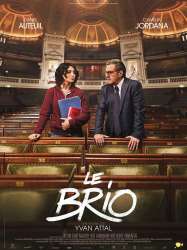
Le Brio (2017)
, 1h37Directed by Yvan Attal
Origin France
Genres Drama, Comedy, Comedy-drama
Themes Transport en Île-de-France, Métro parisien dans la culture populaire
Actors Daniel Auteuil, Camélia Jordana, Nozha Khouadra, Nicolas Vaude, Jean-Baptiste Lafarge, Claude Perron
Roles Self (archive footage)
Rating67%





Neïla Salah, originaire de Créteil, a toujours voulu devenir avocate. Dès ses premiers jours à l'université Panthéon-Assas, elle est confrontée au professeur Pierre Mazard, connu pour ses provocations et ses méthodes particulières. Il a un accrochage avec une étudiante arrivée en retard, qui fait une entrée assez bruyante . Il demande à cette étudiante perturbatrice de lui donner son nom, puis de définir Prénom et Nom, puisqu'il n'est pas sensé , comme de juste de connaître tous les prénoms étrangers. Il fait aussi remarquer que le droit français a évolué depuis Napoléon I, contrairement à la Charia, ce qui est vrai. Il donne pour exemple le choix des prénoms, il plaisante : " avant il fallait choisir le prénom dans le calendrier, à présent on peut appeler son enfant Carte Orange". Du coup, assez bizarrement, il est accusé de racisme. Pour se racheter et un peu manipulé par le directeur de l'université qui « ne peut plus le couvrir », Pierre est contraint de préparer Neïla à un prestigieux concours d’éloquence. Malgré son cynisme et son exigence, Neïla semble trouver en Pierre le mentor dont elle avait besoin. Tous deux vont cependant devoir tout d'abord passer au-dessus de leurs préjugés respectifs.
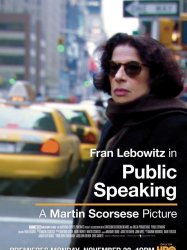
Public Speaking (2010)
, 1h22Directed by Martin Scorsese
Origin USA
Genres Documentary
Themes Documentary films about the visual arts, Documentaire sur une personnalité
Actors Fran Lebowitz, Martin Scorsese, Serge Gainsbourg, Alex Trebek, Candy Darling, Andy Warhol
Roles Self (archive footage)
Rating75%






The Beaches of Agnès (2008)
, 1h50Directed by Agnès Varda
Origin France
Genres Drama, Biography, Documentary
Themes Seafaring films, Transport films, Documentary films about business, Documentary films about the film industry, Documentaire sur une personnalité, Autobiographical documentary films
Actors Jacques Demy, Mathieu Demy, Agnès Varda, Jane Birkin, Yolande Moreau, Gérard Depardieu
Roles Self (archive footage)
Rating79%





« Si on ouvrait les gens, on trouverait des paysages. Moi, si on m’ouvrait, on trouverait des plages. » (Agnès Varda).

Stan the Flasher (1990)
, 1h7Directed by Serge Gainsbourg, Richard Debuisne
Origin France
Genres Drama
Actors Claude Berri, Aurore Clément, Élodie Bouchez, Richard Bohringer, Michel Robin, Daniel Duval
Roles Un ami de David (uncredited)
Rating50%





Un ex-enseignant d'anglais, pervers et exhibitionniste interprété par Claude Berri, est en proie aux difficultés conjugales et au désarroi de la vieillesse, confronté sans cesse à l'image des jeunes filles à qui il donne des cours particuliers dans son appartement « hanté » par sa femme.

Jane B. for Agnès V. (1988)
, 1h45Directed by Agnès Varda
Origin France
Genres Biography, Documentary, Fantasy, Anthology film
Actors Jane Birkin, Jean-Pierre Léaud, Philippe Léotard, Alain Souchon, Serge Gainsbourg, Laura Betti
Roles Self
Rating71%





Portrait de l'actrice britannique Jane Birkin sous forme de collage d'entretiens et de sketches. Un exemple original et recherché de film biographique.
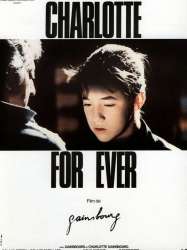
Charlotte for Ever (1986)
, 1h34Directed by Serge Gainsbourg, Jean Couturier
Origin France
Genres Drama
Themes Films about families, Films about sexuality
Actors Charlotte Gainsbourg, Serge Gainsbourg, Roland Bertin, Roland Dubillard, Anne Zamberlan, Anne Le Guernec
Roles Stan
Rating55%





Stan (Serge Gainsbourg) depressed over his wife's death turns his affection over to his daughter Charlotte (Charlotte Gainsbourg).
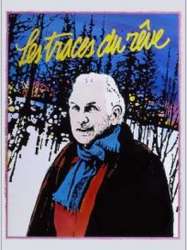
Dream Tracks (1986)
Directed by Jean-Daniel Lafond, C.C., R.C.A.
Origin Canada
Genres Biography, Documentary
Themes Films about films, Documentary films about the film industry
Actors Pierre Perrault, Serge Gainsbourg
Roles lui-même
Rating68%





Des jardins de Versailles à l'Île-aux-Coudres, ce long métrage documentaire rend compte de l'aventure cinématographique exceptionnelle de Pierre Perrault, une aventure parallèle à l'Histoire. En même temps qu'il trace le portrait du poète-cinéaste, le film contient une analyse critique de son œuvre. Pour permettre de pousser encore plus loin la réflexion sur le cinéma et sur l'homme, chasseur d'images, à son tour traqué et révélé tout entier dans ses certitudes autant que dans ses questionnements.
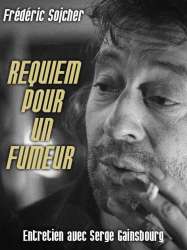
Requiem pour un fumeur (1985)
Directed by Frédéric Sojcher
Origin Belgique
Actors Serge Gainsbourg, Sophie Carle, Jean-Paul Comart, Michael Lonsdale, Picha

The Big Pardon (1982)
, 2h10Directed by Alexandre Arcady
Origin France
Genres Drama, Comedy, Crime
Themes Mafia films, Films about religion, Films about Jews and Judaism, Gangster films
Actors Roger Hanin, Richard Berry, Bernard Giraudeau, Robert Hossein, Jean-Pierre Bacri, Gérard Darmon
Roles lui-même
Rating57%





Le film raconte l'histoire du clan Bettoun — avec à sa tête Raymond (le patriarche), Maurice (le fils), Jacky (le neveu), Roland (le neveu), Albert (le cousin de Raymond), Pépé (l'ami de Raymond) et Samy (le garde du corps) — un clan familial de la mafia juive pied-noire française qui évolue au sein du crime organisé. Le clan Bettoun a la mainmise sur la gestion de casinos, l'organisation de matchs de boxe et de jeux clandestins, le proxénétisme, le racket, et ne craint pas de maintenir son influence par des règlements de compte sanguinaires contre d'autres clans arabes et français.
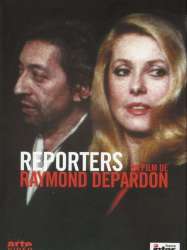
Reporters (1981)
, 1h30Directed by Raymond Depardon
Origin France
Genres Documentary
Themes Documentary films about the visual arts, Photographie
Actors Ursula Andress, François Caron, Coluche, Mireille Darc, Alain Delon, Catherine Deneuve
Roles Self
Rating67%





Le métier de reporters filmé par le réalisateur et photographe Raymond Depardon. Caméra à l'épaule et sans aucun commentaire, ce film est caractéristique d'une certaine forme de cinéma direct.
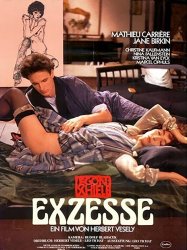 , 1h30
, 1h30Directed by Herbert Vesely
Origin German
Genres Drama, Biography, Historical
Themes Peinture
Actors Mathieu Carrière, Jane Birkin, Christine Kaufmann, Marcel Ophuls, Herbert Fux, Harry Hardt
Rating58%





The final years of the short life of Egon Schiele, the Austrian expressionist painter are chronicled against the backdrop of the final years of the Habsburg rule. The story begins around 1912 as Schiele (Mathieu Carriere) and his mistress and artistic muse Wally (Jane Birkin) are befriended by an obsessed teenage girl (Karina Fallenstein) who has run away to be with Schiele. Subsequently Schiele is imprisoned on the grounds that he has behaved in a sexually improper way towards the young woman. The young woman falsely accuses Schiele and although he denies the charge he is imprisoned. The girl withdraws her accusations but Schiele is requested to leave the area as he has offended the social mores of the conservative society in which he was living. Those offended include his mother (Angelika Hauff) who rails against his lax morals.

I Love All of You (1980)
, 1h40Directed by Claude Berri
Origin France
Genres Drama, Comedy, Comedy-drama, Romance
Actors Jean-Louis Trintignant, Catherine Deneuve, Serge Gainsbourg, Gérard Depardieu, Alain Souchon, Christian Marquand
Roles Simon
Rating58%





Alice, a young business woman, struggles to find her life partner, a task she constantly fails to accomplish. As she and Claude are about to break up, she starts reminiscing about her past relationships. One night she invites her ex-lovers for dinner: Simon, an irascible singer who involves her in his artistic endeavors and with whom she constantly fights; Patrick, a young saxophone player who naively conquers her heart with his doe-eyed glance while accompanying one of Simon's songs; Julien, a tame and shy man who falls for Alice while helping her push her stalled car to a roadside during a thunderstorm. A rather strange journey through her past begins, a journey made of laughs, bitter memories and, ultimately, the confirmation of why she and they are no longer together.
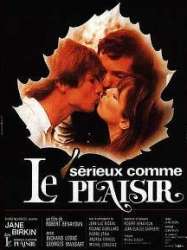
Serious as Pleasure (1975)
, 1h40Origin France
Genres Drama, Comedy, Comedy-drama
Themes Films about sexuality, Transport films, Films about automobiles, Road movies
Actors Jane Birkin, Michael Lonsdale, Richard Leduc, Raymond Bussières, Serge Gainsbourg, Isabelle Huppert
Roles L'inconnu du lac
Rating54%





Ariane, Bruno et Patrice vivent ensemble d’amour, d’eau fraîche et de plaisir. Pour leurs vacances d’été, ils partent au hasard en voiture sur les routes de France au gré de leur fantaisie. Les rencontres qu'ils font sont aussi insolites et surprenantes que leur relation tripartite : un désespéré couché en travers du chemin voudrait finir ses jours en réinventant la mort du Christ, un amoureux esseulé attend au milieu de la route son amoureuse inconnue, une dame toute de blanc vêtue portant ainsi le deuil de son défunt mari noir.

La Dernière Violette (1974)
, 14minutesOrigin France
Actors Serge Gainsbourg, Madeleine Damien
Roles le tueur
Un tueur s'en prend aux vieilles dames.
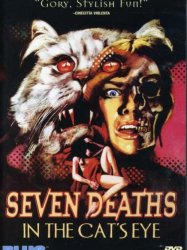 , 1h33
, 1h33Directed by Antonio Margheriti
Origin German
Genres Thriller, Horror, Crime
Actors Jane Birkin, Hiram Keller, Françoise Christophe, Venantino Venantini, Doris Kunstmann, Anton Diffring
Roles Police Inspector
Rating56%





Set in Scotland, the film opens with a man being murdered with a razor by an unknown killer. The killer drags the man’s body into a dimly lit dungeon and is followed by a ginger cat. The camera focuses on the ginger cat’s face as the scene switches.
 Connection
Connection



